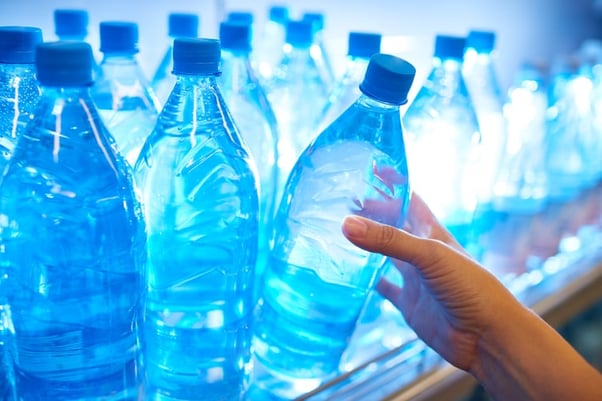Before we get into the mineral content of bottled water, let’s start with the basics. Bottled water seems like a no-brainer, right? Wrong. Check out the EPA’s water health series on bottled water basics. It’s not as simple as you think.
What is bottled water?
Bottled water can be distinguished by how it has been treated or by the water’s source. Treatment methods include distillation, micron filtration, ozonation, reverse osmosis, or ultraviolet light (UV) treatment. It’s also important to know the difference between filtered and purified water.
The water’s original source might consist of artesian, ground, spring, or well. Did you know that terms such as “glacier water” or “mountain water” are just "marketing-speak? These “water locations” are not officially regulated sources, and the water may not be sourced from them at all.
To determine how your bottled water has been treated or where it comes from, it’s best to simply turn the bottle over and read the nutrition label or contact the bottler directly to ask specific questions.
Why do people like bottled water better?
For most people, the reason they like bottled water better than tap water is because of its taste. Municipalities that treat the water from our faucets traditionally use chlorine to disinfect the water. Conversely, bottlers frequently use ozone because it does not leave an after-taste.
It’s important to note that neither the EPA nor the FDA “certify” bottled water, although any bottled water sold in the United States must meet minimum federal standards set by the FDA. Your state regulates tap water provided by your public water system under the EPA’s national standards.
What’s in my bottled water?
Most people have two main concerns about what is in their bottled water:
- What contaminants are in the water?
- What minerals are in the water?
Your best way to get these answers is to contact the bottler and ask for the latest testing results.
Mineral Water
Water marketed as “mineral water” must contain at least 250 parts per million of total dissolved solids originating from a geologically and physically protected underground water source. This means the minerals cannot be added to the water during manufacturing; they must occur naturally. Common minerals found in mineral water include magnesium, calcium, sodium, and zinc.
Non-Mineral Water
Standard tap water and most bottled waters not explicitly labeled “mineral water” also include many of these same minerals; however, they may not occur in equally high numbers or quantities, and they are added through a manufacturing process rather than occurring naturally.
Hard Water
For those living in areas with hard water, we know that our water contains too many minerals, particularly calcium and magnesium. While our water is still safe to drink, it’s tough on our pipes and appliances.
The bottom line is that most health experts believe that there is no substantial benefit to drinking bottled water over tap water for most of us, other than a personal preference for taste. If you think your hard water is affecting more than just the taste of your water, reach out to your local water pros at Advantage.







